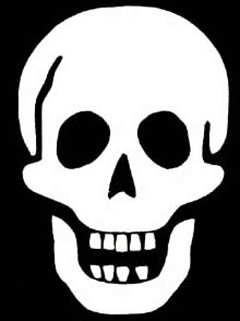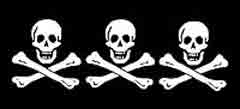English Words in Action, Group S
(a variety of English words which have developed through history and are currently used in our modern age)
Simply click on this banner (or the following link) and you will be on your way to stimulate your brain for greater word comprehension with quizzes based on some of the words in this unit.
2. Nervous or worried: Some skittish children are afraid to meet strangers.
3. Easily startled or timid and afraid: The cat is calm and friendly with people it knows, but it becomes a skittish cat when strangers come to visit.
2. To hide because of cowardice or a bad conscience: Isaac said that he would skulk in a corner and feel very sorry for himself if he were to encounter any kind of disaster.
3. Etymology: from Middle English of Scandinavian origin. In Norwegian skulka, "lurk" ("to sneak" "to exist unobserved") and Danish skulke, Swedish skoika, "to shirk" ("to avoid").
2. The head which is regarded as the seat of thought or intelligence: Oliver told his brother to use his head, or skull, and to stop smoking.

Skulls have several functions or uses
- The skull encases and protects the brain, houses organs of special senses, provides points of attachment for muscles of the head and neck, and it helps to form the first parts of the breathing, or respiratory, and digestive tracts.
- Many of the bones are hollow, thus reducing the weight of the skull and adding to the sound of the voice.
- All of the bones of the skull, except the mandible, are fixed to each other by immovable joints known as sutures.
There are several cavities in the skull:
- The cranial cavity, where the brain is located.
- The nasal cavity, which is involved with smelling and breathing.
- The orbits, where the eyeballs and their associated muscles exist.
- Part of the mouth is also formed by the skull.
This information about skulls and crossbones, which is utilizing the pictures, will NOT cause you any harm!


2. Someone who is completely dominated by another person or something: Brian admits that he is a slave to alcohol, but he can't stop it.
3. A person who meekly accepts being ruled by someone else: The husband, the poor slave, was continually taking orders from his wife to do all the work around the house and to spend his money to take her on trips, even when he didn't want to do any of those things.
4. Someone who works or has to work very hard, often in bad conditions and for low pay: Trudy has been a slave in her job and so she should have left the company a long time ago.
5. Etymology: originally a reference to Slavs. This sense of development resulted because of the wars waged by Otto the Great and his successors against the Slavs, a great number of whom were taken captive and sold into servitude.
The name Slav has the literal meaning of "speaker" and they are members of any of the people of Eastern Europe and North Western Asia that speak one of the Slavonic languages; such as, those who speak Bulgarian, Russian, and Polish.
The term apparently appeared in the 14th century via medieval Latin Sclavus from medieval Greek Sklabos, an alteration of Old Slavic Sloveninu.
Slavery is known as an institution or social practice of owning human beings as property; especially, when they are used as forced laborers.
2. Showing no originality; blindly imitative: The painting is a slavish imitation of Van Gogh's style.
Are the politicians sleazily saying one thing during one speech and then the complete opposite later in a different flip-flop presentation?
Links to all of the groups of English words in action, Groups A to Z.
You may see the bibliographic list of sources of information for these words in action.


